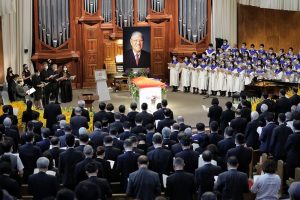When former Taiwanese President Lee Teng-hui died on July 30, he left behind a legacy as the man who helped democratize his country. He was also remembered as a strident champion of Taiwanese identity as the first native-born Taiwanese to hold the office of president.
Speaking at his memorial service on Saturday, current President Tsai Ing-wen praised Lee for his “pragmatic diplomacy,” as well as for laying “the foundation for democratization and Taiwanization.”
“We have a responsibility to continue his endeavors, allowing the will of the people to reshape Taiwan, further defining Taiwan’s identity and deepening and bolstering democracy and freedom,” she added.
It was fitting, then, that Lee’s memorial service helped secure some rare diplomatic engagement for Taiwan as current and former politicians from partner countries paid their respects.
Most notably, Lee’s memorial service – held on September 19 at Aletheia University in Taipei – was attended by Keith Krach, U.S. under secretary of state for economic growth. Krach is the highest-ranking diplomat to visit Taiwan since the United States severed diplomatic ties in 1979. “The United States honors President Lee’s legacy by continuing our strong bonds with Taiwan and its vibrant democracy through shared political and economic values,” the State Department said in a statement announcing Krach’s trip.
While attending Lee’s memorial service was the main rationale for the trip, Krach also had dinner with Tsai and held talks with Taiwan’s minister of economic affairs, Wang Mei-hua. Afterward, Wang said the United States and Taiwan would be opening a senior level Economic and Commercial Dialogue “as soon as possible.” Tsai’s administration is engaged in a major push for trade talks with the United States, including a preemptive decision to remove restrictions on U.S. pork and beef imports, long a stumbling block to any trade agreement. Notably, however, Wang said that Krach would lead the U.S. side of the dialogue — rather than an official from the Office of the U.S. Trade Representative, which handles free trade negotiations.
Krach was not the only foreign dignitary in Taipei for Lee’s memorial service. It was also attended by former Japanese Prime Minister Mori Yoshiro. Mori made headlines by saying that Suga Yoshihide, Japan’s prime minister as of last week, had expressed interest in talking to Tsai in a phone call. If such a call took place, it would have marked a major departure from Japan’s previously cautious approach to relations with Taiwan – no Japanese prime minister has spoken to Taiwan’s president since the two severed diplomatic relations in 1972.
Tsai later clarified that there were no immediate plans for such a phone call.
Suga’s predecessor, long-time Japanese Prime Minister Abe Shinzo, provided written remarks honoring Lee that were read at the service by Japan’s top representative in Taiwan, Chief Representative Izumi Hiroyasu. Both Abe’s written remarks and Mori’s speech at the service noted Lee’s contributions to furthering Japan-Taiwan friendship, including by bolstering universal values like democracy and human rights in Taiwan.
The Dalai Lama also gave video remarks at the service, calling Lee a “great friend,” adding that he hoped Lee (a devout Christian) would be reborn in Taiwan to “carry his spirit [on] continuously.”
“I admire his commitment about democracy, freedom and preservation of Chinese culture in Taiwan,” the exiled Tibetan spiritual leader said.
The spate of diplomatic contact with Taiwan did not go unnoticed in Beijing. On the day of Lee’s memorial service, China sent 19 warplanes, including two bombers, across the median line in the Taiwan Strait, according to Taiwan’s Defense Ministry. A day earlier, 18 Chinese military aircraft had crossed the median line. Beijing often uses military provocations to signal its displeasure with political happenings on Taiwan, which Chinese Communist Party leaders claim as part of the People’s Republic.
































